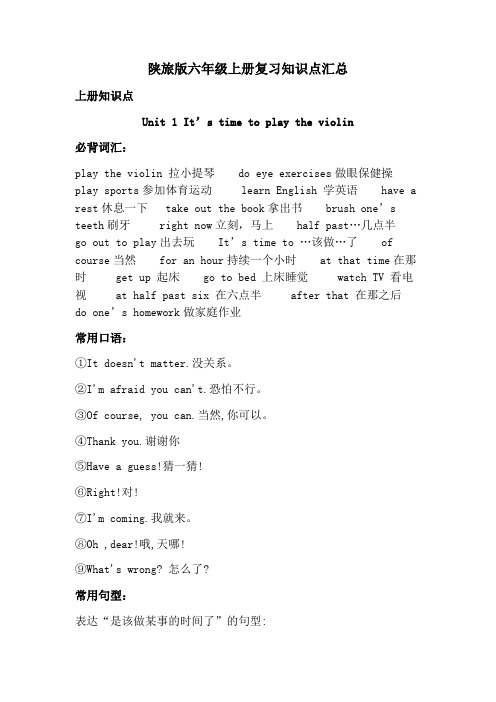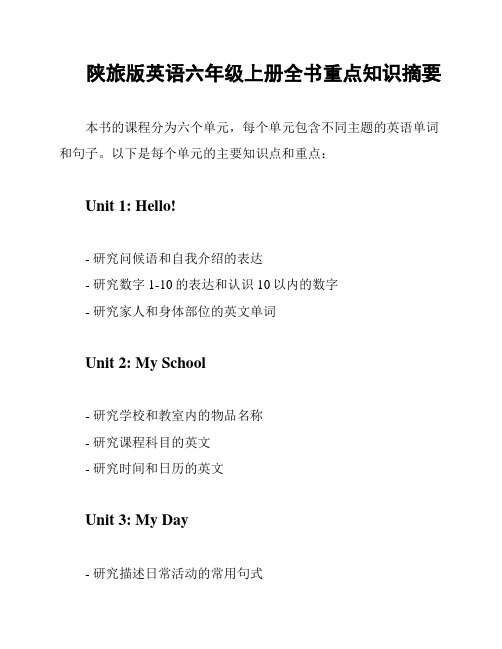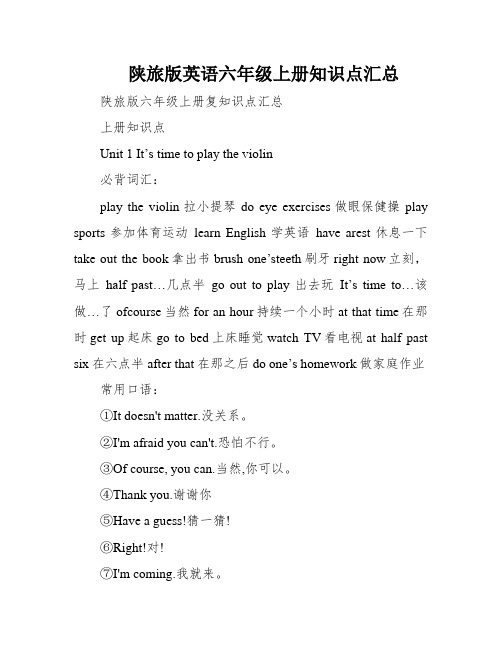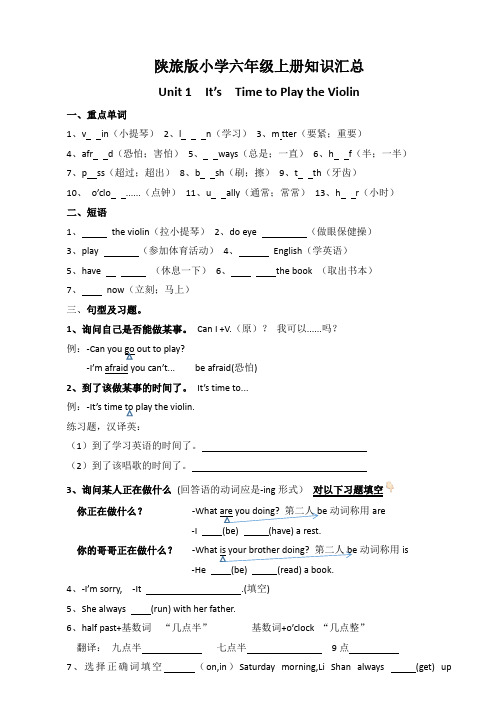陕旅版英语六年级上册知识点总结
陕旅版六年级上册英语第一单元知识点总结

陕旅版六年级上册英语第一单元知识点总结一、单词学习1. 单词:1) 姓氏:surname2) 名字:name3) 国家:country4) 语言:language5) 女孩:girl6) 男孩:boy7) 孩子:child8) 还:also9) 是:be10) 你的:your2. 重点词组:1) 你的名字是什么?:What's your name?2) 我的名字是……:My name is...3) 你也是:You are also4) 你也是我国人吗?:Are you also Chinese?5) 他也是:He is also6) 我的姓氏是……:My surname is...7) 你的国家是哪个?:Which country are you from?二、句型学习1. 询问名字的句型:1) What's your name?2) My name is…2. 询问国籍的句型:1) Which country are you from?2) I am from China.三、语法学习1. be动词的用法:1) am, is, are的用法和区别,以及其在简单句中的运用。
2. 形容词的用法:1) 在句子中修饰名词,让句子更加生动。
四、文章正文在陕旅版六年级上册英语第一单元中,我们学习了有关个人信息的表达,包括尊称、国籍和语言等。
通过学习这些词汇和句型,我们能够更好地介绍自己,向他人询问其个人信息,并进行简单的交流。
让我们来学习一些单词。
在本单元中,我们学习了一些关于个人信息的单词,如surname(姓氏)、name(名字)、country(国家)和language(语言)等。
这些词汇是我们介绍自己和询问他人信息时的关键词。
我们也学习了一些描述人的单词,如girl(女孩)、boy(男孩)、child(孩子)等,这些词汇可以帮助我们更生动地描述自己和他人。
除了单词外,我们还学习了一些重要的词组和句型。
最新 陕旅版六年级上册英语各单元知识点汇总

陕旅版六年级上册复习知识点汇总上册知识点Unit 1 It’s time to play the violin必背词汇:play the violin 拉小提琴 do eye exercises做眼保健操play sports参加体育运动 learn English 学英语 have a rest休息一下 take out the book拿出书 brush one’s teeth刷牙 right now立刻,马上 half past…几点半go out to play出去玩 It’s time to …该做…了 of course当然 for an hour持续一个小时 at that time在那时 get up 起床 go to bed 上床睡觉 watch TV 看电视 at half past six 在六点半 after that 在那之后do one’s homework做家庭作业常用口语:①It doesn't matter.没关系。
②I'm afraid you can't.恐怕不行。
③Of course, you can.当然,你可以。
④Thank you.谢谢你⑤Have a guess!猜一猜!⑥Right!对!⑦I'm coming.我就来。
⑧Oh ,dear!哦,天哪!⑨What's wrong? 怎么了?常用句型:表达“是该做某事的时间了”的句型:It's time to play the violin.It's time to do eye exercises.It's time to have a rest.描述某人的日常习惯的句型Li Shan always gets up at half past six.Jim always reads books on weekends.I always play football after school.Unit 2 I’m healthy必背词汇:take a walk散步 lay ping-pong打乒乓球 play tennis 打网球 go boating去划船 go skating去滑冰 go shopping去购物 look healthy看起来健康 healthy food 健康的食物 drink milk 喝牛奶 a lot of许多 how often多久一次 every day每天 be good for对…好,对…有益 in the morning在上午 in the afternoon在下午 twice a week一周两次 once a month一月一次three times三次 do well in在……做得好 be good at 擅长…… run after追赶 in the day在白天 at night在晚上常用口语:Really? 真的吗?0h,no!哦,不!Sorry ,I don’t know.对不起,我不知道。
陕旅版六年级英语上册全册各单元知识总结

Unit 1It's Time to Play the Violin一、核心词汇1. 名词: violin 小提琴tooth 牙齿hour 小时2. 副词: always 总是;一直usually 通常;常常o'clock……点钟3. 动词: learn 学习brush 刷;擦4. 短语: play the violin 拉小提琴do eye exercises 做眼保健操play sports 参加体育活动learn English 学英语have a rest 休息一下take out the book 取出书本right now 立刻;马上5. 其他: matter 要紧;重要afraid 恐怕;害怕half 半;一半past 超过;超出二、拓展词汇1. 名词: time 时间Saturday星期六morning早上afternoon下午breakfast 早饭dinner晚饭face脸2. 动词及其第三人称单数形式: get(s)得到brush(es)刷;擦wash(es)洗run(s)跑watch(es)看;注视play(s)玩;弹奏go(es)去;走3. 代词: my我的your你的her她的I我you你she她it它4. 副词: first首先;第一then 然后5. 介词: after 在……以后on/at/in在……之时with和6. 短语: cook dinner 做晚饭go to bed 去睡觉go swimming 去游泳brush my teeth刷牙have lunch吃午饭watch TV 看电视read a book 看书do my homework 做家庭作业get up 起床三、核心句型1. — What time do you usually get up? 你通常几点起床?— I get up at seven. 我七点起床。
解读: 这是用于询问某人在什么时间做某事及其回答的句型。
陕旅版英语六年级上册知识点总结

Unit 1 Where were you yesterday?单词:museum(博物馆) gym(体育馆) market(市场) church(教堂) supermarket(超市) beach(沙滩)cafe(咖啡馆) cinema(电影院) hospital(医院)重要句型:Where were you yesterday morning/afternoon/evening?(你昨天早上/中午/晚上在哪里?)I was at the cinema/at school/at a party.(我在电影院/学校/派对。
)Be动词:is am are 过去式:was wereeg: I/She/He/It wa s……You/We/They were……Unit 2 How was your trip?单词:trip(旅行/行程) beautiful(美丽的) relaxed(放松的) historic(历史悠久的) crowded(拥挤的) friendly(友好的)splendid(壮观的) busy(繁忙的) modern(现代的) 重要句型:How was your trip to Chengdu?(to后接地名)(你去成都的旅行怎么样?)It was wonderful. (很棒)Where did you go? (你去了哪儿?)Did you take any photos? (你拍了照片吗?)May I have a look? (我能看一下吗?)形容城市:It’s modern but crowded.Unit 3 A birthday party单词:drink(饮料) coke(可乐) sandwich(三明治) French fries(薯条) activity(活动) play games(做游戏)orange juice(橙汁) hot dog(热狗) sweater(毛衣)jeans(牛仔裤) food(食物)重要句型:What did she/he/you/they do?(她/他/你/他们做了什么?)注意是过去做了什么Did you watch TV at the weekend? (你周末看了电视吗?)No, I didn’t. I played computer games. (没有,我玩了电脑游戏.)give sb. Sth.(给某人某物)give sth. to sb.( 把某物给某人)eg: I give Kitty a book.I give a book to Kitty.注意:动词过去式规则变化+edwatch-watched(看) play-played(玩) walk-walked(走) dance-danced(跳舞) close-closed(关闭) climb-climbed(爬)不规则变化:go-went(走) run-ran(跑) buy-bought(买)study-studied(学习) wear-wore(穿/戴) eat-ate(吃)have-had(有) forget-forgot(忘记)Unit 4 On a farm单词: brush(刷) better(更好的) weekend(周末) after(在…之后) before(在…之前)feed the pigs(喂猪) milk the cow(挤牛奶)brush the horse(刷马毛) pick apples(摘苹果)gather eggs(捡鸡蛋) water the garden(浇花)harvest the corn(收割玉米/谷物)重要句型:I feel much better. (我感觉好多了)What did you do at the weekend? (你周末干了什么?)Help sb. do sth.(帮助某人做某事)eg: We help Uncle Wang pick apples.(我们帮助王叔叔摘苹果.) Why not+原型动词(为什么不……)eg: Why not go with us next Saturday?(为什么不下周六跟我们一起去呢?)引申:pig-leftovers(剩饭剩菜) horse-straw(稻草) chick-worm(虫)cow-grass(草) cat-mice(老鼠) dog-bone(骨头)Unit 5 Halloweenfestival(节日) last(上一个) house(房子) ghost(鬼) Halloween(万圣节) costume party(化妆舞会) mask(面具) Pumpkin lantern(南瓜灯) go trick-or-treating(不给糖就捣蛋)重要句型: We had a fancy costume party.(我们开了一个奇特的化妆舞会。
陕旅版六年级英语上知识要点

词性转化一、名词或动词变形容词。
health健康-----healthy健康的help帮助-----helpful有用的friend朋友-----friendly友好的dirt灰尘---- dirty脏的luck运气------lucky幸运的sun太阳------sunny晴朗的snow雪-------snowy下雪的rain雨--------rainy下雨的wind风--------windy刮风的cloud云-------cloudy多云的interest爱好-interesting有趣的excite使…兴奋-exciting兴奋的interest爱好—interested令人感兴趣的excite使-兴奋—excited令人兴奋的color颜色---colorful五颜六色的fun趣事----funny有趣的lose丢失-----lost丢失的love爱-----lovely可爱的二、反义词free闲的----busy忙的here这儿---there那儿healthy健康的—ill生病的clean净-----dirty脏happy/excited快乐的/兴奋的---sad悲伤的heavy重---light轻cry哭—laugh笑behind后-----in front of 前left左---right右right对----wrong错good/great好--bad坏cut砍---plant载put into放入—take out of取出ask问---answer答 waste浪费---save节约always一直---never从不 go away离开—get to 到达hungry饿的—full饱的 last最后的—first第一的start开始—end结束 little/small小—big大short短—long长 ago以前—after以后new新—old旧 early早—late迟 in里---out外far远—near近 lose丢失—find找到 go去---come来sit坐—stand站 up向上---down向下be good for对什么有用-be bad for 对什么有害at the beginning开始-finally最后三、同义词学习learn—study 森林woods—forest小little—small 健康的healthy—well最后的last—finally 起初at first—at the beginning 想要want—would like 家home—family秋季fall—autumn 去野餐go on a picnic—have a picnic 看watch---see 附近near—beside—next to怎么样how about—what about 擅长be good at---do well in 吃have---eat 也too—also 半时thirty----half past在晚上in the evening—at night 何时what time—when许多a lot of/lots of—many/much 大heavy—big房子house—room 美nice—beautiful怎么了What's the matter?/ What's wrong?/ What's u p?必须have to—must 礼物present—gift当然sure/certainly/of course 旅行travel----go on a trip棒极了great—wonderful 昨晚last night—yesterday eve ning 两次two times/twice一次one time/once何时when-what time 照相take photos—take pictures玩得愉快had a good/great time—enjoy oneself四、同音词hour小时---our我们的see看—sea大海by乘—buy买right右/正确的---write写won赢(win的过去式)--one一red红的—read(read的过去式)know知道—no不,没有too也—two二/to hear听—here这儿there那儿—their 他们的meet见面---meat肉eight八—ate(eat的过去式)new新—knew(know的过去式)hi你好---high高blue 蓝色的----blew(blow的过去式)wear 穿(衣)---- where 在哪里五、基数词变序数词第一、二、三要全变,其余“th”加后面,"th”里有例外八去"t" 九去"e" 字母"f"代"ve" "ty"变成"tie"one一—first第一two二----second第二three三---thir dfive五—fifth第五eight八—eighth第八nine九---ninth第九twelve十二----twelfth第十二twenty二十---twentieth第二十thirty三十---thirtieth第三十forty四十----fortieth第四十sixty六十---sixtieth第六十seventy七十---seventieth eighty八十----eightieth第八十ninety九十----ninetieth第九十hundred一百---one hundredth六、特殊动词单三形式have—has do---does go---goes watch---watcheswash---washes brush----brushes teach---teachescry---cries try---tries fly---flies study—studieslike---likes play—plays七、特殊动词inglike---liking love---loving move---moving make---making have---having skate---skating ride----riding hike-----hiking give---giving care---caring write----writing hope---hoping come—coming become---becoming dance---dancinglive—living leave---leaving use----usingclose---closingsee---seeing free---freeing play---playingdraw---drawing lie---lyingrun---running sit----sitting let----lettingput---putting shop----shopping swim---swimming get---getting begin---beginning mop---mopping cut---cutting stop----stopping start---starrtinghit---hitting dig---digging八、形容词变副词real真正的---really真正地final最后的—finally最后地loud大声的-loudly大声地beautiful美丽的-beautifully美丽地kind和蔼的—kindly和蔼地slow慢的---slowly慢慢地heavy重的---heavily重地careful细心的—carefully细心地easy,happy,healthy,angry,noisy变法与heavy相同fast,early,high,late,far既是形容词,又是副词true真的---truly真地九、名词单数变复数photo相片—photos potato土豆----potatoeszoo动物园---zoos tomato西红柿---tomatoeswatch手表---watches match比赛----matchesclass课----classes dress衣服—dressesglass玻璃—glasses眼镜beach海滩---beachesknife小刀---knives scarf围巾----scarvesboy男孩—boys cherry樱桃----cherriesstory故事---stories family家庭---familiescity城市---cities candy糖果---candiesbaby婴儿---babies strawberry 草莓--- strawberryies man人---men woman妇女---womenfoot脚---feet policeman警察---policementooth牙齿---teeth mouse老鼠—micebox盒子—boxes brush刷子-----brushesbus公共汽车---buses piano钢琴---pianosfox狐狸---foxes wolf狼---wolvessheep绵羊---sheep,fish鱼----fish deer鹿---deer people 人----people,water水,food食物,milk牛奶,tea茶,rice 米饭,orange橘子汁,juice果汁,cola可乐,bread面包,pork猪肉,beef牛肉,beer啤酒,coffee咖啡,Chinese语文—Chinese Janpese日语---Janpese本学期出现的词汇Unit 1 It’s time to play the violinPlay the violin 拉小提琴,do eye exercises做眼保健操,play sports参加体育运动,learn English 学英语,have a rest休息一下,take out the book拿出书,brush one’s teeth刷牙.right now立刻,马上,half pas t…几点半,go out to play出去玩It’s time to…该做…了,of course当然,for an hour持续一个小时,at that time在那时,UNIT2 I’m healthytake a walk散步,play ping-pong打乒乓球,play tennis打网球,go boating去划船,go skating去滑冰,go shopping去购物,look healthy看起来健康,healthy food健康的食物,a lot of许多,how often多久一次,every day每天,be good for对…好,in the morning在上午,in the aftertoon在下午,twice a week一周两次,once a month一月一次,three times三次,do weel in 擅长run after追赶,in the day在白天,at night在晚上,UNIT3 Care for the Earthpick flowers摘花,cut down trees砍树,make the air dirty污染空气,waste water浪费水,drive a car开车,care for the carth关爱地球,have to 不得不,必须,why not为什么不,World CarFree Day世界无车日,because因为,do something for为…做些事,go to work上班,on foot步行,live on 住在…上,sometimes有时,too many/much太多,only one唯一的,plant more trees载更多的树,do bad things to对…做坏事,损坏…,help the animals帮助动物be helpful t o…对做…有用,had better最好,make the air clean净化空气,Unit 4 Let’s go on a picnicgo on a picnic 去野餐 take out of 从……取出put into 放进……里面 get to the park 到达公园meet at the gate 在大门口会合Have a good time.玩得开心点be free 空闲 What’s up? 怎么啦?at the foot of…在……脚下 come back 返回 get to 到达on weekends在每个周末,have the picnic野餐,too far太远next Saturday下周六,a little一点儿, Old People’s Home养老院,read books读书,sounds good听起来不错,litter on the floor乱扔垃圾,in the tree在树上,too small太小,Unit 5 It Was Here Just Nowscarf(围巾) wallet (钱包)sunglasses(太阳镜) gloves(手套)warm jacket(棉夹克) rain boots(雨靴)school bag(书包) heavy重的,大的,lost丢的,in front of在…前面,just now刚才,yesterday昨天,behind在…后面,last night昨晚,too bad太糟糕,still 仍然,hundred百,thousand千,thirty years ago 三十年前,wear穿,on a rainy day在雨天,Unit 6 What Did You Do Last Weekend ?watch a show (看表演) look after (照顾,照看)do housework (做家务) see a friend (看望朋友)have a match (举行比赛) go away (离开)go away from home离开家busy忙, work工作, hear听到,last weekend 上周末,make the bed铺床,do the dishes洗餐具,clean the windows擦窗户,water the flowers浇花,cook the meal 做饭,wash the clothes洗衣服,in the hospital在医院里,in hospital住院,sounds great听起来棒极了,be sorry to对…难过happen发生,about关于,ill in bed,卧病在床Unit 7. I Had a Good Timeplay beach volleyball打沙滩排球,visit the museum参观博物馆,buy some gifts买些礼物,eat sea food吃海鲜,make a cake做蛋糕,the Great Wall长城,the Terra-cotta Warriors秦兵马俑the West Lake 西湖,Mount Tai 泰山,Huangguoshu Falls 黄果树瀑布,the Stone Forest石林,stay at home 呆在家。
陕旅版小学英语六年级上册单元知识总结(全册)(完美版)

Unit 1It'sTimetoPlaytheViolin一、核心词汇1. 名词:violin 小提琴tooth 牙齿hour 小时2. 副词:always 总是;一直usually 通常;常常o'clock……点钟3. 动词:learn 学习brush 刷;擦4. 短语:playtheviolin 拉小提琴doeyeexercises 做眼保健操playsports 参加体育活动learnEnglish 学英语havearest 休息一下takeoutthebook 取出书本rightnow 立刻;马上5. 其他:matter 要紧;重要afraid 恐怕;害怕half 半;一半past 超过;超出二、拓展词汇1. 名词:time 时间Saturday星期六morning早上afternoon下午breakfast早饭dinner晚饭face脸2. 动词及其第三人称单数形式:get(s)得到brush(es)刷;擦wash(es)洗run(s)跑watch(es)看;注视play(s)玩;弹奏go(es)去;走3. 代词:my我的your你的her她的I我you你she她it它4. 副词:first首先;第一then 然后5. 介词:after 在……以后on/at/in在……之时with和6. 短语:cookdinner 做晚饭gotobed 去睡觉goswimming 去游泳brushmyteeth 刷牙havelunch吃午饭watchTV 看电视readabook 看书domyhomework 做家庭作业getup 起床三、核心句型1. — Whattimedoyouusuallygetup? 你通常几点起床?— Igetupatseven. 我七点起床。
解读: 这是用于询问某人在什么时间做某事及其回答的句型。
举一反三: — Whattimedoyouoftengotoschool?你经常几点去上学?— Igotoschoolathalfpastseven. 我七点半去上学。
陕旅版英语六年级上册全册知识点汇总

Unit 1It's Time to Play the Violin一、核心词汇1. 名词: violin 小提琴tooth 牙齿hour 小时2. 副词: always 总是;一直usually 通常;常常o'clock……点钟3. 动词: learn 学习brush 刷;擦4. 短语: play the violin 拉小提琴do eye exercises 做眼保健操play sports 参加体育活动learn English 学英语have a rest 休息一下take out the book 取出书本right now 立刻;马上5. 其他: matter 要紧;重要afraid 恐怕;害怕half 半;一半past 超过;超出二、拓展词汇1. 名词: time 时间Saturday星期六morning早上afternoon 下午breakfast早饭dinner晚饭face脸2. 动词及其第三人称单数形式: get(s)得到brush(es)刷;擦wash(es)洗run(s)跑watch(es)看;注视play(s)玩;弹奏go(es)去;走3. 代词: my我的your你的her她的I我you你she她it 它4. 副词: first首先;第一then 然后5. 介词: after 在……以后on/at/in在……之时with和6. 短语: cook dinner 做晚饭go to bed 去睡觉go swimming去游泳brush my teeth刷牙have lunch吃午饭watch TV 看电视read a book 看书do my homework 做家庭作业get up 起床三、核心句型1. —What time do you usually get up? 你通常几点起床?—I get up at seven. 我七点起床。
解读: 这是用于询问某人在什么时间做某事及其回答的句型。
六年级上册英语书陕旅版内容

六年级上册英语书陕旅版内容一、单词部分。
1. 按单元整理。
- Unit 1.- 重点单词:例如,“may”(可以),“school”(学校),“library”(图书馆)等。
可以列出单词的词性、词义、音标(如果有要求)。
- 单词记忆方法:像“library”可以拆分成“li - bra - ry”,联想图书馆里有很多书(book)等记忆小技巧。
- Unit 2.- 重点单词:如“postcard”(明信片),“e - mail”(电子邮件)等。
- 记忆技巧:“postcard”是由“post”(邮政)和“card”(卡片)组成的复合词。
2. 分类整理。
- 场所类:“school”“library”“post office”(邮局)等。
- 通讯类:“e - mail”“postcard”等。
二、句型部分。
1. 按单元整理。
- Unit 1.- 重点句型:“May I...?”(我可以……吗?)例如,“May I have a book?”(我可以拿一本书吗?)及其肯定回答“Yes, you may.”和否定回答“No, you may not.”- 句型的用法:用于请求许可,通常在学校、图书馆等场所使用,向他人请求做某事的许可。
- Unit 2.- 重点句型:“I want to... ”(我想要……)如“I want to send a postcard.”(我想要寄一张明信片。
)- 用法:表达自己的愿望或想要做的事情。
2. 功能句型整理。
- 请求类:“May I...?”- 愿望表达类:“I want to... ”三、语法部分。
1. 一般现在时。
- 在课本中的体现:例如,在描述学校的日常活动或者图书馆的规则时会用到。
如“He goes to school every day.”(他每天去上学。
)- 动词第三人称单数形式的变化规则:一般情况下加“s”,以“s, x, ch, sh, o”结尾的加“es”等。
陕旅版英语六年级上册全书重点知识摘要

陕旅版英语六年级上册全书重点知识摘要
本书的课程分为六个单元,每个单元包含不同主题的英语单词和句子。
以下是每个单元的主要知识点和重点:
Unit 1: Hello!
- 研究问候语和自我介绍的表达
- 研究数字1-10的表达和认识10以内的数字
- 研究家人和身体部位的英文单词
Unit 2: My School
- 研究学校和教室内的物品名称
- 研究课程科目的英文
- 研究时间和日历的英文
Unit 3: My Day
- 研究描述日常活动的常用句式
- 研究天气和季节的表达
- 研究一些介绍自然风光的词汇
Unit 4: My Home
- 研究家庭成员和家居用品的英文
- 研究接受或拒绝邀请的表达方式
- 研究在宾馆和餐厅常用的英文语句
Unit 5: Fun Time
- 研究谈论喜好和爱好的常用表达方式
- 研究运动、游戏、音乐和绘画的英文词汇- 研究在购物时询问价格和支付方式的英文
Unit 6: Happy Holidays
- 研究描述节日和庆典的表达方式
- 研究区分不同交通工具的名称和特点
- 研究在旅游和出行中常用的英语短语和表达
以上是本书的主要知识点和重点内容,对于六年级的小学生来说,学习这些基础知识将会帮助他们构建起扎实的英语语言基础,为将来的学习打下坚实的基础。
陕旅版英语六年级上册知识点汇总

陕旅版英语六年级上册知识点汇总陕旅版六年级上册复知识点汇总上册知识点Unit 1 It’s time to play the violin必背词汇:play the violin拉小提琴do eye exercises做眼保健操play sports参加体育运动learn English学英语have arest休息一下take out the book拿出书brush one’steeth刷牙right now立刻,马上half past…几点半go out to play出去玩It’s time to…该做…了ofcourse当然for an hour持续一个小时at that time在那时get up起床go to bed上床睡觉watch TV看电视at half past six在六点半after that在那之后do one’s homework做家庭作业常用口语:①It doesn't matter.没关系。
②I'm afraid you can't.恐怕不行。
③Of course, you can.当然,你可以。
④Thank you.谢谢你⑤Have a guess!猜一猜!⑥Right!对!⑦I'm coming.我就来。
⑧Oh,dear!哦,天哪!⑨What's wrong?怎么了?常常使用句型:表达“是该做某事的时间了”的句型:It'XXX.It'XXX.It'XXX.描述某人的日常惯的句型XXX.XXX.XXX.Unit 2 I’m XXX必背词汇:take a walk散步lay ping-pong打乒乓球play XXX打网球go boating去划船go skating去滑冰goshopping去购物look XXX看起来健康healthy food健康的食物drink milk喝牛奶a lot of许多howoften多久一次every day每天be good for对…好,对…有益in XXX在上午XXX在下午twice a week一周两次once a month一月一次three times三次do weel in在……做得好be good at擅长……run after追赶in the day在白天XXX在晚上常用口语:Really?真的吗?0h,no!哦,不!Sorry,I don’t know.对不起,我不知道。
陕旅版英语六年级上册重点知识汇总

陕旅版小学六年级上册知识汇总Unit 1 It’s Time to Play the Violin一、重点单词1、v in(小提琴)2、l n(学习)3、m tter(要紧;重要)4、afr d(恐怕;害怕)5、ways(总是;一直)6、h f(半;一半)7、p ss(超过;超出)8、b sh(刷;擦)9、t th(牙齿)10、o’clo ......(点钟)11、u ally(通常;常常)13、h r(小时)二、短语1、the violin(拉小提琴)2、do eye (做眼保健操)3、play (参加体育活动)4、English(学英语)5、have (休息一下)6、the book (取出书本)7、now(立刻;马上)三、句型及习题。
1、询问自己是否能做某事。
Can I +V.(原)?我可以......吗?例:--I’m afraid you can’t... be afraid(恐怕)2、到了该做某事的时间了。
It’s time to...例:-It’s time to play the violin.练习题,汉译英:(1)到了学习英语的时间了。
(2)到了该唱歌的时间了。
3、询问某人正在做什么(回答语的动词应是-ing形式)对以下习题填空你正在做什么?-动词称用are-I (be) (have) a rest.你的哥哥正在做什么?-动词称用is-He (be) (read) a book.4、-I’m sorry, -It .(填空)5、She always (run) with her father.6、half past+基数词“几点半”基数词+o’clock “几点整”翻译:九点半七点半9点7、选择正确词填空(on,in)Saturday morning,Li Shan always (get) up(at ,on)half past six.8、介词in的用法,in 年in月,in四季,上午下午和晚上。
陕旅版六年级英语上册知识要点

词性转化一、名词或动词变形容词。
health健康-----healthy健康的help帮助-----helpful有用的friend朋友-----friendly友好的dirt灰尘---- dirty脏的luck运气------lucky幸运的sun太阳------sunny晴朗的snow雪-------snowy下雪的rain雨--------rainy下雨的wind风--------windy刮风的cloud云-------cloudy多云的interest爱好-interesting有趣的excite使…兴奋-exciting 兴奋的interest爱好—interested令人感兴趣的excite使-兴奋—excited令人兴奋的color颜色---colorful五颜六色的fun趣事----funny有趣的lose丢失-----lost丢失的love爱-----lovely可爱的二、反义词free闲的----busy忙的here这儿---there那儿healthy健康的—ill生病的clean净-----dirty脏happy/excited快乐的/兴奋的---sad悲伤的heavy重---light轻cry哭—laugh笑behind后-----in front of前left左---right右right对----wrong错good/great好--bad坏cut砍---plant载put into放入—take out of取出ask问---answer答waste浪费---save节约always一直---never从不go away离开—get to 到达hungry饿的—full饱的last最后的—first第一的start开始—end结束little/small小—big大short短—long长ago以前—after以后new新—old旧early早—late迟in里---out外far远—near近lose丢失—find找到go去---come来sit坐—stand站up向上---down向下be good for对什么有用-be bad for 对什么有害at the beginning开始-finally最后三、同义词学习learn—study 森林woods—forest小little—small 健康的healthy—well最后的last—finally 起初at first—at the beginning想要want—would like 家home—family秋季fall—autumn 去野餐go on a picnic—have a picnic 看watch---see 附近near—beside—next to怎么样how about—what about 擅长be good at---do well in吃have---eat 也too—also 半时thirty----half past在晚上in the evening—at night 何时what time—when许多a lot of/lots of—many/much 大heavy—big房子house—room 美nice—beautiful怎么了What's the matter?/ What's wrong?/ Wh at's up?必须have to—must 礼物present—gift当然sure/certainly/of course 旅行travel----go on a trip棒极了great—wonderful 昨晚last night—yesterday evening 两次two times/twice一次one time/once 何时when-what time 照相take photos—take picture s玩得愉快had a good/great time—enjoy oneself四、同音词hour小时---our我们的see看—sea大海by乘—buy 买right右/正确的---write写won赢(win的过去式)--o ne一red红的—read(read的过去式)know知道—no不,没有too也—two二/to hear听—here这儿there那儿—their他们的meet见面---meat肉eight八—ate(eat的过去式)new新—knew(know的过去式)hi你好---high高blue 蓝色的----blew(blow的过去式)wear 穿(衣) ---- where 在哪里五、基数词变序数词第一、二、三要全变,其余“th”加后面,"th”里有例外八去"t" 九去"e" 字母"f"代"ve" "ty"变成"tie"one一—first第一two二----second第二three三---thirdfive五—fifth第五eight八—eighth第八nine九---ninth第九twelve十二----twelfth第十二twenty二十---twentieth第二十thirty三十---thirtieth 第三十forty四十----fortieth第四十sixty六十---sixtieth第六十seventy七十---seventieth eighty八十----eightieth第八十ninety九十----ninetieth第九十hundred一百---onehundredth六、特殊动词单三形式have—has do---does go---goes watch---watcheswash---washes brush----brushes teach---teachescry---cries try---tries fly---flies study—studieslike---likes play—plays七、特殊动词inglike---liking love---loving move---moving make---making have---having skate---skating ride----riding hike-----hiking give---givingcare---caring write----writing hope---hopingcome—coming become---becoming dance---dancinglive—living leave---leaving use----usingclose---closingsee---seeing free---freeing play---playingdraw---drawing lie---lyingrun---running sit----sitting let----lettingput---putting shop----shoppingswim---swimmingget---getting begin---beginning mop---moppingcut---cutting stop----stopping start---starrting hit---hitting dig---digging八、形容词变副词real真正的---really真正地final最后的—finally最后地loud大声的-loudly大声地beautiful美丽的-beautifully美丽地kind和蔼的—kindly和蔼地slow慢的---slowly慢慢地heavy重的---heavily重地careful细心的—carefully细心地easy,happy,healthy,angry,noisy变法与heavy相同fast,early,high,late,far既是形容词,又是副词true真的---truly真地九、名词单数变复数photo相片—photos potato土豆----potatoeszoo动物园---zoos tomato西红柿---tomatoeswatch手表---watches match比赛----matchesclass课----classes dress衣服—dressesglass玻璃—glasses眼镜beach海滩---beachesknife小刀---knives scarf围巾----scarvesboy男孩—boys cherry樱桃----cherriesstory故事---stories family家庭---familiescity城市---cities candy糖果---candiesbaby婴儿---babies strawberry 草莓--- strawberryies man人---men woman妇女---womenfoot脚---feet policeman警察---policementooth牙齿---teeth mouse老鼠—micebox盒子—boxes brush刷子-----brushesbus公共汽车---buses piano钢琴---pianosfox狐狸---foxes wolf狼---wolvessheep绵羊---sheep,fish鱼----fish deer鹿---deer people 人----people,water水,food食物,milk牛奶,tea茶,rice 米饭,orange橘子汁,juice果汁,cola可乐,bread面包,pork 猪肉,beef牛肉,beer啤酒,coffee咖啡,Chinese语文—Chinese Janpese日语---Janpese本学期出现的词汇Unit 1 It’s time to play the violinPlay the violin 拉小提琴,do eye exercises做眼保健操,play sports参加体育运动,learn English 学英语,have a rest休息一下,take out the book拿出书,brush one’s teeth刷牙.right now立刻,马上,half past…几点半,go out to play出去玩It’s time to …该做…了,of course当然,for an hour持续一个小时,at that time在那时,UNIT2 I’m healthytake a walk散步,play ping-pong打乒乓球,play tennis打网球,go boating去划船,go skating去滑冰,go shopping去购物,look healthy看起来健康,healthy food健康的食物,a lot of许多,how often多久一次,every day每天,be good for对…好,in the morning在上午,in the aftertoon在下午,twice a week 一周两次,once a month一月一次,three times三次,do weel in擅长run after追赶,in the day在白天,at night在晚上,UNIT3 Care for the Earthpick flowers摘花,cut down trees砍树,make the air dirty污染空气,waste water浪费水,drive a car开车,care for the carth 关爱地球,have to 不得不,必须,why not为什么不,World Car Free Day世界无车日,because因为,do something for为…做些事,go to work上班,on foot步行,live on 住在…上,sometimes有时,too many/much太多,only one唯一的,plant more trees载更多的树,do bad things to对…做坏事,损坏…,help the animals帮助动物be helpful to…对做…有用,had better最好,make the air clean净化空气,Unit 4 Let’s go on a picnicgo on a picnic 去野餐take out of从……取出put into 放进……里面get to the park 到达公园meet at the gate 在大门口会合Have a good time. 玩得开心点be free 空闲What’s up? 怎么啦?at the foot of…在……脚下come back 返回get to到达on weekends在每个周末,have the picnic野餐,too far太远next Saturday下周六,a little一点儿,Old People’s Home 养老院,read books读书,sounds good听起来不错,litter on the floor乱扔垃圾,in the tree在树上,too small太小,Unit 5 It Was Here Just Nowscarf(围巾)wallet (钱包)sunglasses(太阳镜)gloves(手套)warm jacket(棉夹克)rain boots(雨靴)school bag(书包)heavy重的,大的,lost丢的,in front of在…前面,just now刚才,yesterday昨天,behind在…后面,last night昨晚,too bad太糟糕,still 仍然,hundred百,thousand千,thirty years ago 三十年前,wear穿,on a rainy day在雨天,Unit 6 What Did You Do Last Weekend ?watch a show (看表演)look after (照顾,照看)do housework (做家务)see a friend (看望朋友)have a match (举行比赛)go away (离开)go away from home离开家busy忙, work工作, hear听到,last weekend上周末,make the bed铺床,do the dishes洗餐具,clean the windows 擦窗户,water the flowers浇花,cook the meal做饭,wash the clothes洗衣服,in the hospital在医院里,in hospital住院,sounds great听起来棒极了,be sorry to对…难过happen发生,about关于,ill in bed,卧病在床Unit 7. I Had a Good Timeplay beach volleyball打沙滩排球,visit the museum参观博物馆,buy some gifts买些礼物,eat sea food吃海鲜,make a cake做蛋糕,the Great Wall长城,the Terra-cotta Warriors 秦兵马俑the West Lake 西湖,Mount Tai 泰山,Huangguoshu页眉内容Falls黄果树瀑布,the Stone Forest石林,stay at home 呆在家。
陕旅版六年级英语上册知识要点归纳【全套】

陕旅版六年级英语上册知识要点一、重点句型1、该做某事的时候了。
It is time to do sth. to 后面跟动词原形。
It is time for sth. for后面跟的是名词或者动词ing 形式。
2、"Why not +动词原形"表达向某人提出建议,翻译为:"为什么不...?" "干吗不...?"3、Shall we+动词原形?表示征求对方意见,“我们...好吗?”4、“let’s+动词原形”,"让我们...吧。
"或"咱们...吧。
"5、How/What about... ?提出某种建议,... 怎么样;... 好吗?about 为介词,介词后加名词、动词ing 形式、代词等。
6、“have to+动词原形”不得不做某事。
7、“be helpful to+动词原形”有益于做某事。
8、“had better+动词原形”最好做某事。
9、“would like to /want to+动词原形”想要做某事。
10、Would you like some...?你想要点...?11、“make sb +动词原形”使某人做某事。
12.How often do/does +主语+动词原形?某人多久一次做...how often 提问频率13、May/Can I ...?我可以...吗?肯定回答:Sure/Certainly/Of course(, you can).否定回答Sorry,you can’t./No,you can’t./I’m afraid not/I’m afraidyou can’t.二、情态动词+动词原形can ,may,must,should,could,might+动词原形三、助动词+动词原形shall,will,do/does/did+动词原形四、重点句子1、It’s time to play the violin. 该拉小提琴了。
六年级上册英语陕旅版第一单元

陕旅版六年级上册英语第一单元知识点一、重点词汇解析1.by plane /baɪ pleɪn/ 乘飞机-解析:“by + 交通工具”表示乘坐某种交通工具。
-例句:I go to Beijing by plane.(我乘飞机去北京。
)2.by train /baɪ treɪn/ 乘火车-解析:同样是“by + 交通工具”的用法。
-例句:He goes to Shanghai by train.(他乘火车去上海。
)3.by ship /baɪ ʃɪp/ 乘轮船-解析:表示乘坐轮船出行的方式。
-例句:They go on a trip by ship.(他们乘轮船去旅行。
)4.by bus /baɪ bʌs/ 乘公共汽车-解析:常见的交通出行方式表述。
-例句:We go to school by bus.(我们乘公共汽车去上学。
)5.on foot /ɒn fʊt/ 步行-解析:依靠双脚走路的方式。
-例句:I go to the park on foot.(我步行去公园。
)6.place /pleɪs/ 地方;场所-解析:表示某个具体的地点或位置。
-例句:This is a beautiful place.(这是一个美丽的地方。
)7.the Great Wall /ðə ɡreɪt wɔːl/ 长城-解析:中国著名的历史遗迹。
-例句:I want to visit the Great Wall.(我想去参观长城。
)8.travel /ˈtrævl/ 旅行;旅游-解析:通常指到不同的地方去游玩。
-例句:I like to travel during my holidays.(我喜欢在假期去旅游。
)二、重点句型1.—How do you go to...?(你怎么去……?)—I go to...by.../on foot.(我乘……去……/我步行去……)-解析:用于询问出行方式及回答。
- 1、下载文档前请自行甄别文档内容的完整性,平台不提供额外的编辑、内容补充、找答案等附加服务。
- 2、"仅部分预览"的文档,不可在线预览部分如存在完整性等问题,可反馈申请退款(可完整预览的文档不适用该条件!)。
- 3、如文档侵犯您的权益,请联系客服反馈,我们会尽快为您处理(人工客服工作时间:9:00-18:30)。
Unit 1 Where were youyesterday?
单词:museum(博物馆)gym(体育馆)market(市场) church(教堂) supermarket(超市) beach(沙滩)
cafe(咖啡馆) cinema(电影院)hospital(医院)
重要句型:Where were you yesterday morning/afternoon/ev ening?
(你昨天早上/中午/晚上在哪里?)
I was atthe cinema/at school/at a party.
(我在电影院/学校/派对。
)
Be动词:isamare 过去式:was were
eg: I/She/He/It wa s……You/We/They were……
Unit 2 How was your trip?
单词:trip(旅行/行程) beautiful(美丽的) relaxed(放松的) historic(历史悠久的) crowded(拥挤的)friendl y(友好的)
splendid(壮观的)busy(繁忙的) modern(现代的)
重要句型:How was yourtripto Chengdu?(to后接地名)
(你去成都的旅行怎么样?)
It waswonderful.(很棒)
Where did you go? (你去了哪儿?)
Didyoutake any photos?(你拍了照片吗?)
May I have a look?(我能看一下吗?)
形容城市:It’smodern but crowded.
Unit 3 A birthdayparty
单词:drink(饮料)coke(可乐) sandwich(三明治)
French fries(薯条)activity(活动) playgames(做游戏)
orangejuice(橙汁)hotdog(热狗)sweater(毛衣)
jeans(牛仔裤) food(食物)
重要句型:What didshe/he/you/they do?
(她/他/你/他们做了什么?)注意是过去做了什么
Didyouwatch TV at theweekend?(你周末看了电视吗?)
No,I didn’t. I playedcomputer games. (没有,我玩了电脑游戏.)
give sb. Sth.(给某人某物)
give sth. to sb.( 把某物给某人)
eg:I give Kitty a book.
I give a book toKitty.
注意:动词过去式规则变化+ed
watch-watched(看) play-played(玩)walk-walked(走)
dance-danced(跳舞)close-closed(关闭) climb-climbed(爬)
不规则变化:
go-went(走) run-ran(跑) buy-bought(买)
study-studied(学习) wear-wore(穿/戴)eat-ate(吃)
have-had(有) forget-forgot(忘记)
Unit 4 On afarm
单词:brush(刷) better(更好的)weekend(周末)
after(在…之后) before(在…之前)
feedthepigs(喂猪) milk the cow(挤牛奶)
brush the horse(刷马毛) pick apples(摘苹果) gather eggs(捡鸡蛋) water thegarden (浇花)
harvestthecorn(收割玉米/谷物)
重要句型:I feel much better. (我感觉好多了)
Whatdid you doat theweekend? (你周末干了什么?)
Help sb.do sth.(帮助某人做某事)
eg: We help Uncle Wang pickapples.(我们帮助王叔叔摘苹果.)
Why not+原型动词(为什么不……)
eg:Why notgo withus next Saturday?
(为什么不下周六跟我们一起去呢?)
引申:pig-leftovers(剩饭剩菜) horse-straw(稻草) chick-worm(虫)
cow-grass(草) cat-mice(老鼠) dog -bone(骨头)
Unit5 Halloween
festival(节日) last(上一个) house(房子) ghost(鬼)
Halloween(万圣节)costume party(化妆舞会)mask(面具)
Pumpkinlantern(南瓜灯) go trick-or-treating(不给糖就捣蛋)
重要句型: We hada fancy costume party.
(我们开了一个奇特的化妆舞会。
)
Wemademany lanterns with pumpkins.
(我们用南瓜做了许多灯。
)
Idon’t have a costume here. (我这里没有可供换装的衣服)
Neither do I.(我也没有)
Idon’t thinkchildren shouldeattoo many candies.
(我认为小孩子不应该吃那么多糖。
)
You are too old to gotrick-or-treating.(too…to 太而不能)
Unit 6Where isthe post office?
单词:post office(邮局) gasstation(加气站) drugstore(药店)
bank(银行) department store(百货商店) hot el(宾馆)
children’s park(儿童乐园) bus station(公交汽车站)
excuse(原谅) straight(直地) ahead(往前)
block(街区) next to(紧挨着) opposit eto(在…对面)
重要句型:Whereisthe post office?(邮局在哪儿?)
Go straightaheadfor twoblocks. The nturn right on Third street. (向前直走两个街区,然后
在第三大道向右转。
)
The postofficeisnext totheban k.(邮局紧挨着银行。
)
Thehospital is opposite to the drugstore.
(医院在药店对面。
)
Unit 7How faris it fromChina?
单词:north(北) south(南) west(西) east(东) between(在…中间)in frontof(在…前面) behind
(在…的后面)
重要句型:How far is it from China? (它离中国有多远?)
About 10,000kilometers. (大约10000千米。
)
Howlong isthe flight? (航程需要多久?)
About 12hours. (大约12个小时。
)
It’s west/east/north/south of China.
(它在中国的西/东/北/南面)
注意:onehundred 100
one thousand 1000
tenthousand 10,000
onehundred thousand100,000
one million1,000,000
Unit 8 Look at myphotos
单词:match(比赛) win(赢)gohiking(徒步旅行) team(队)
classmate(同班同学) take photos(照相)
have a football match(举行足球比赛)
win a goldmedal(赢得金牌) open the present(打开礼物)
read apoem(朗诵诗歌) have abarbecue(进行烧烤)
重要句型:Lookatmy photos!(看我的照片!)
How happy I was! (我是多么高兴!)
How+形容词+人称代词+be动词构成感叹句
My father took it formelast year. (去年我爸爸为我照的。
)
注意:take part in:参加。
